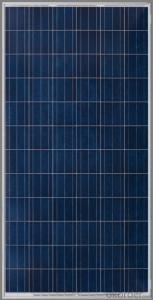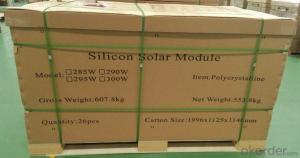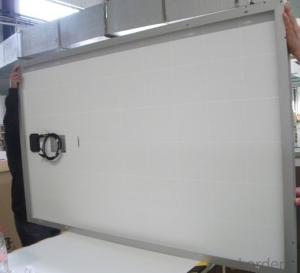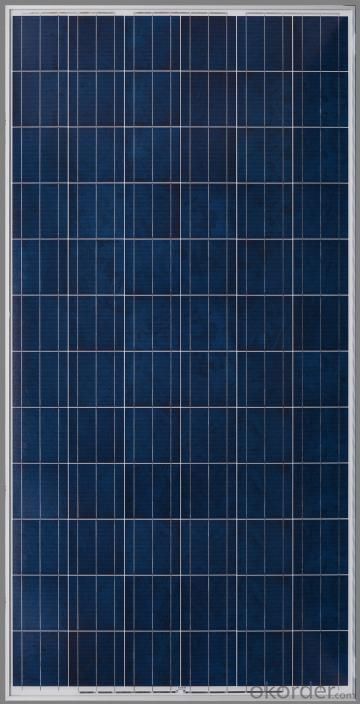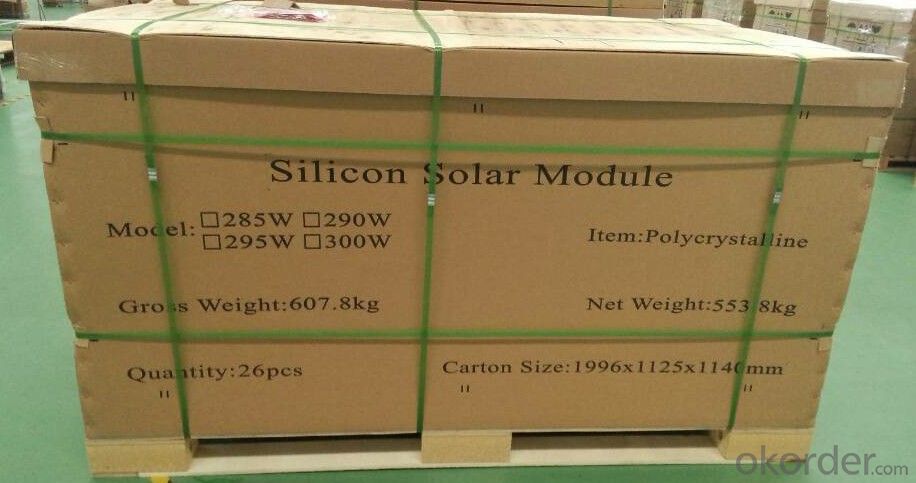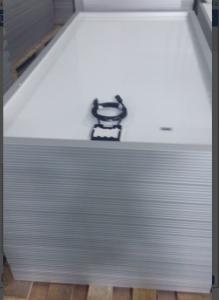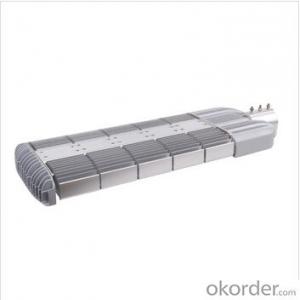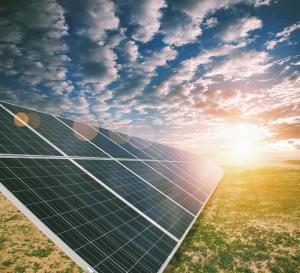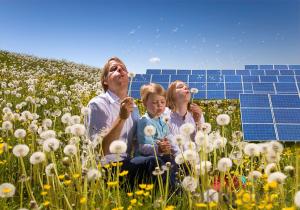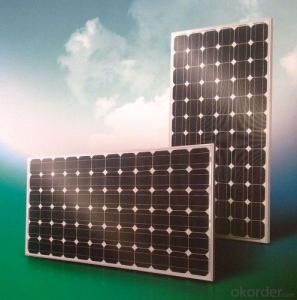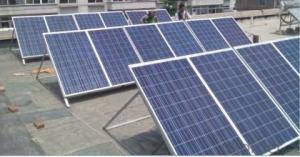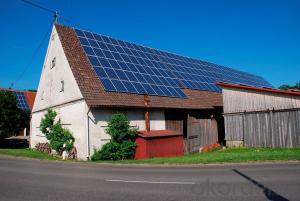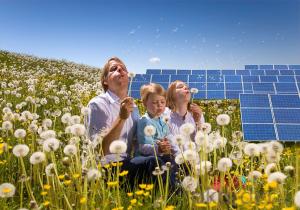310w Polycrystalline Silicon Solar Panels in St Louis
- Loading Port:
- China Main Port
- Payment Terms:
- TT or LC
- Min Order Qty:
- 5 watt
- Supply Capability:
- 100000 watt/month
OKorder Service Pledge
OKorder Financial Service
You Might Also Like
Solar Polycrystalline Series Panels
Introduction of Solar Polycrystalline Series Panels
CNBM PV Panel is designed for large electrical power requirements. It is the optimal choice for both on-grid and off-grid power systems. CNBM Solar panel offers high performance of power per square foot of solar array. Monocrystalline silicon(c-Si): often made using the Czochralski process. Single-crystal wafer cells tend to be expensive, and because they are cut from cylindrical ingots, do not completely cover a square solar cell module without a substantial waste of refined silicon. Hence most c-Si panels have uncovered gaps at the four corners of the cells.
Characteristics of Solar Polycrystalline Series Panels
I Tempered glass (toughened glass): Anti-reflecting coating and high transmission rate glass increase the power output and mechanical strength of solar module.
II AI frame: Without screw, corner connection. 6 holes on the frame can be installed easily.
III Long lifetime: ≥25 years; Less power decrease
IV Resisting moisture and etching effectively, not effected by geology.
Standard Test Conditions of Solar Polycrystalline Series Panels
The opto-electrical specifications shown below are stabilized values being measured at Standard Test Conditions, Irradiance: 1000W/m2, Spectrum: AM1.5 at 25°C, The info below is subject to manufacturing tolerances. Where appropriate minutes of measurement are available and are used for the dimensioning of the installation.
Advantages of Solar Polycrystalline Series Panels
* Flexible and durable
* light and easy to transport
* Timeliness of delivery
* Fast delivery
Limits
Operating Temperature | –40 °C to +85°C |
Storage Temperature | –40 °C to +85°C |
Max System Voltage | 700V |
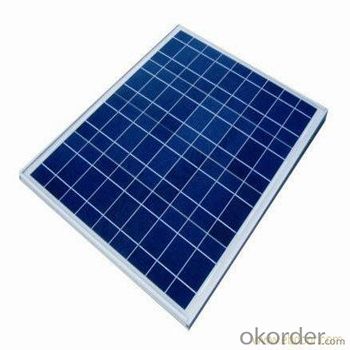
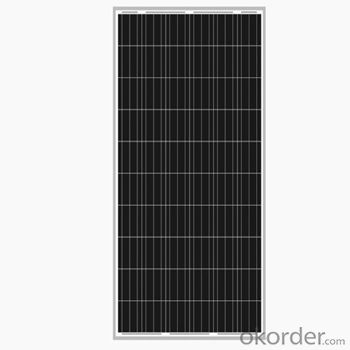
FAQ:
1. What’s price per watt?
A: It’s depends on the quantity, delivery date and payment terms of the order. We can talk further about the detail price issue. Our products is high quality with lower price level.
2. Can you tell me the parameter of your solar panels?
We have different series of cells with different power output, both from c-si to a-si. Please take our specification sheet for your reference.
3. How do you pack your products?
We have rich experience on how to pack the panels to make sure the safety on shipment when it arrives at the destination.
- Q: Can solar panels be used to power a data center?
- Yes, solar panels can be used to power a data center. Solar energy can be harnessed through photovoltaic panels and converted into electricity to power a data center's operations. This approach helps reduce reliance on traditional energy sources and promotes sustainability. However, the feasibility and effectiveness of using solar panels will depend on factors like the size of the data center, available sunlight, and energy requirements.
- Q: Can solar panels be installed on schools or educational campuses?
- Yes, solar panels can be installed on schools or educational campuses. In fact, many educational institutions are increasingly adopting solar energy systems as a sustainable and cost-effective solution for their power needs. Installing solar panels on schools not only helps reduce carbon emissions and reliance on fossil fuels, but also provides educational opportunities for students to learn about renewable energy and its benefits. It can also lower electricity bills and redirect saved funds towards educational programs.
- Q: Can solar panels be installed on water treatment plants or utilities?
- Yes, solar panels can be installed on water treatment plants or utilities. In fact, many water treatment plants and utilities are increasingly adopting solar power as a sustainable and cost-effective energy solution. Solar panels can be installed on rooftops, open fields, or even on floating platforms over water bodies, providing clean energy to power the operations of these facilities.
- Q: Can solar panels be used in conjunction with a backup generator?
- Yes, solar panels can be used in conjunction with a backup generator. This setup is known as a hybrid solar power system and it allows for continuous power supply even during periods of low sunlight or when the solar panels are not generating enough electricity.
- Q: I have heard you can make your own solar panels.... But How?Where do you start? Is it cheap, or should I just BUY them already made?
- If you're thinking of solar electric panels then forget it. It you just want to dabble in solar power then shop around for a 5 volt panel. Find out how many watts it puts out and then divide the cost $$ by the wattage. The lower the cost per watt the better of a deal you'll be getting That's generally speaking of course because it doesn't take quality into account but it's a practical way to compare panels. On the other hand, it you want to make a solar panel that will heat hot water then it's a different story. You can have a lot of fun with that project and you'll find a lot of plans on the Internet.
- Q: Do solar panels work at night?
- No, solar panels do not work at night as they require sunlight to generate electricity.
- Q: Can solar panels be used in agriculture?
- Yes, solar panels can be used in agriculture. They provide a renewable and clean source of energy that can power various agricultural activities such as irrigation systems, lighting, and machinery. Additionally, solar panels can be installed on agricultural buildings or unused land, allowing farmers to generate their own electricity and reduce their carbon footprint.
- Q: How do solar panels affect roof warranty?
- Solar panels can potentially affect roof warranty, as their installation involves drilling holes into the roof and attaching the panels. This may void certain aspects of the roof warranty, especially those related to leaks or damage caused by the installation. It is important to review the terms of the roof warranty and consult with a professional installer to understand the specific impact solar panels may have on the warranty.
- Q: Can solar panels be installed on a theater or entertainment venue?
- Yes, solar panels can be installed on a theater or entertainment venue. In fact, many theaters and entertainment venues have embraced solar energy as a sustainable and cost-effective solution for their energy needs. Solar panels can be installed on the roof or any available open space surrounding the building, generating clean and renewable electricity to power the venue's operations. This not only helps reduce their carbon footprint but also saves on energy costs in the long run.
- Q: How efficient are the solar panels....?
- There is over 000 watts of power in a square meter of sunshine. A square meter panel converts only about 20% of it into electricity (200 watts). At my workplace, I have a photo-voltaic solar panel electrical system. Its maximum capacity is about 25 kilowatts. On a sunny day it will produce about 80 kilowatt hours of electricity, but we average about 50 kwh/day. At current value, that adds up to a saving of about $4,000 per year, which sounds nice but that's only about a tenth of my total power bill. The system cost $00,000. Pay-back is 25 years (which by coincidence is the length of the warranty). To answer your question more directly: solar panels are not quite efficient enough to be economical.
Send your message to us
310w Polycrystalline Silicon Solar Panels in St Louis
- Loading Port:
- China Main Port
- Payment Terms:
- TT or LC
- Min Order Qty:
- 5 watt
- Supply Capability:
- 100000 watt/month
OKorder Service Pledge
OKorder Financial Service
Similar products
Hot products
Hot Searches
Related keywords
